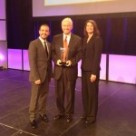4 ways to boost team performance
Posted by lward on Nov 4, 2022 in PMChat Bloggers, Uncategorized | Comments Off

We all know that throwing a bunch of people together and calling them a team doesn’t make them a team. But teams in the workplace are more common than ever. In the cross-functional, matrix-oriented project environment, teams are a way of life. If we don’t work well together, the project suffers as a result. A recent survey (1,072 employed US adults) conducted by Harris Interactive for the University of Phoenix indicates that teamwork, whether it be in projects or not, is suffering. Here are some statistics from the survey that really caught my attention: More than 4-in-five adults find it difficult to work in teams When asked why the situation seems so bleak, 45% felt there is an “in-it-for-oneself” mentality 40% of adults cite that fewer employees are doing more work 35% say that electronic communication (e-mail, IM, texting) is a barrier because it has reduced face-to-face communication More than 52% feel that a clack of clearly defined roles contribute to poor teamwork Of working adults who think teams struggle, 61% say there is not enough training on how to work as a team Only 26% of the respondents who are college graduates said teamwork was a focus in their university education So, what do we do with this information? We can do four things right away.
Read MoreEric Jenett: The Man…..and the Award
Posted by lward on Oct 27, 2022 in PMChat Bloggers, Uncategorized | Comments Off

Eric Jenett–a giant in our field Eric Jenett was a giant in our field. He was one of PMI’s five original founders, was PMI’s first Project Management Professional, a PMI Fellow, PMI’s President in 1971, Chairman in 1972 and Secretary from 1975 to 1976. He was also a founding member of the Houston Chapter as well as a thought-leader in the field. As evidence of this Eric went on to author more than 30 publications and presentations. Eric gave freely of his time to advocate for project management and to help build the world’s largest professional association of project managers. I met him once many years ago and chatted with him at a PMI conference. He didn’t know me from “Adam” as the old saying goes, but he spent a good bit of time talking to me.
Read MoreHow to sell project management to Execs….Screw up BIG TIME
Posted by lward on Oct 14, 2022 in PMChat Bloggers, Uncategorized | Comments Off

Many project professionals I’ve met through the years complain that their executives don’t support project management. They try to make the case for PM but just can’t penetrate the exec mindset that it’s not worth it. Sadly, the only time execs will listen is when something bad, really bad happens. So, one sure-fire way to get the execs to invest in improving project management performance is to screw up BIG TIME! How big? Well look at two examples from history; granted, these weren’t necessarily projects but you get the idea. An otherwise capable General, he went down in history for one of the biggest strategic military mistakes of the Indian Wars.
Read MoreThis is what happens when you don’t have a Plan B
Posted by lward on Oct 7, 2022 in PMChat Bloggers, Uncategorized | Comments Off

Long time readers of this blog know I live and work in New York City. The ESI office is located on the corner of Water and Wall Streets in the Financial District. It was an area hard hit by Super Storm Sandy one year ago. In fact, we had 5 feet of water in our office building lobby causing us to relocate for 4 months. The area around my building has not fully returned to normal. Following are some pics I took today at lunch of some of the lingering affects caused by that massive storm.
Read MorePay project managers bonuses BEFORE they earn them
Posted by lward on Sep 30, 2022 in PMChat Bloggers, Uncategorized | Comments Off

I just read a very interesting, and counterintuitive suggestion, in the article “Why Make Them Wait” on the thebuildnetwork , a favorite web site of mine. In it, researchers Adam Grant from the Wharton and economics professor Roland Fryer from Harvard say a company might be better off giving rewards before the employee (in this case our project manager) achieved anything. (Boy, I like the sound of this. I think I’ll bring it up in our next management meeting….NOT!). Here’s what they did. Fryer’s research divided some teachers into groups of two each of which received bonuses based on the improvement in student test scores on a standardized math test. The first group received their bonuses at the beginning of the year, and were told they would lose that money if the students’ test scores did not improve
Read More


